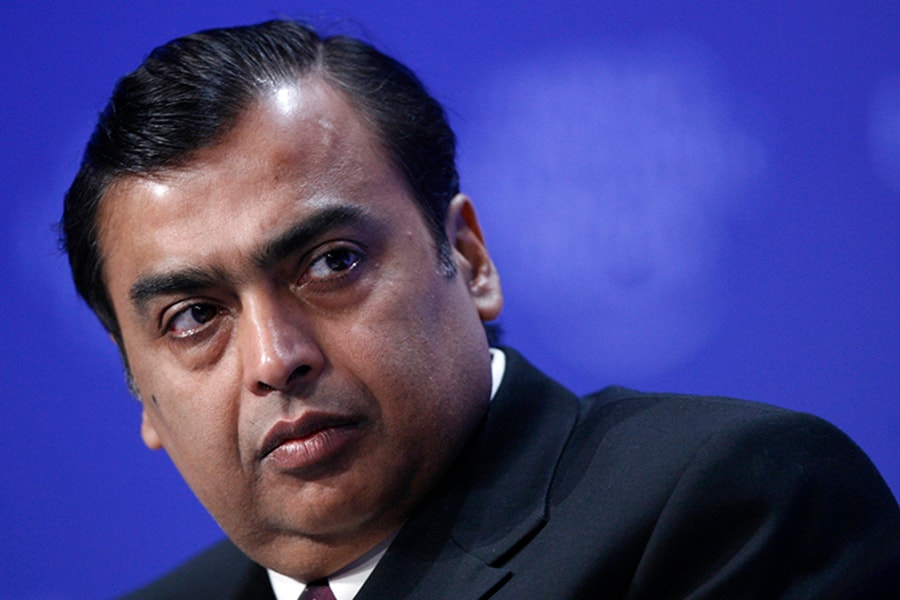58 Indian companies in 2018 Forbes 'Global 2000' list
Banks and oil and gas companies dominate among Indian firms on the list of the world's biggest, best, influential, and valuable publicly listed companies


 Reliance Industries Ltd chairman Mukesh Ambani
Reliance Industries Ltd chairman Mukesh Ambani
Image: Denis Balibouse / Reuters
Fifty-eight Indian companies featured on the 2018 Forbes ‘Global 2000’ list of the world’s largest public sector companies, the same number as last year. Banks and oil firms dominated among the Indian companies on the list of the world’s major, most powerful, and valuable publicly listed companies.
Forbes, which released the list on Wednesday, uses a mix of four metrics to create its list—sales, profits, assets and market value. Equal weightage is given to all four metrics to rank companies according to size. For this, the latest-12-months’ financial data is used.
The Mukesh Ambani-led oil-to-telecom conglomerate, Reliance Industries Ltd (RIL), catapulted 23 places to rank at 83, up from rank 106 last year, retaining its top spot as the most valued Indian company on the list. The rise in popularity of its one-year-old telecom arm, Reliance Jio, and a bounce back in oil prices to earlier highs, has taken the market capitalisation of the company to $93.1 billion, up from $71.2 billion in the year-ago period.
HDFC Bank, the country’s largest financier, took the second spot among Indian companies, ranking at 202 in 2018 (up 56 spots from rank 258 in 2017), with a market capitalisation of $77.6 billion.
Three oil companies and three banks each, found their spots among the top ten Indian companies. The country’s largest state-run bank, State Bank of India (SBI), with a market capitalisation of $33.3 billion made up the tenth spot among Indian companies.
Twenty-two Indian banks found a spot on the list, a feat at a time when the entire Indian banking sector is struggling and battling high levels of stressed assets in a weak lending environment. Five oil and gas companies, including ONGC (rank 266), Indian Oil (rank 270), Bharat Petroleum (rank 672), Hindustan Petroleum (rank 951) found their place among the 58 Indian companies.
Among IT services, three companies made it to the list, including TCS (rank 404), Infosys (653), Wipro (rank 909).
Tata Motors, the automobile arm of the salt-to-software Tata Group, was one of the two (the other being Mahindra & Mahindra) Indian automobile companies on the list. It ranked at 385 ($16.8 billion) on the Global 2000 list, falling 95 spots from its rank 290 last year.
Chinese banking giants dominated the spots in the top ten of the 2018 Global 2000 list. Industrial & Commercial Bank of China is ranked 1 for the sixth consecutive year, while China Construction Bank retained its number two spot. The other two of China’s “Big Four” banks – Agricultural Bank of China and Bank of China – ranked at number five and nine, respectively, safeguarding their places in the top ten of the list.
While US companies also retained its dominance in the global market, Berkshire Hathaway, slipped one spot to number 4 on this year’s list, losing its title of US’s most valuable company. JPMorgan Chase took its place instead, with a market cap of $387.7 billion.
Rounding out the top ten are Agricultural Bank of China (No. 5), Bank of America (No. 6), Wells Fargo (No. 7), Apple (No. 8), Bank of China (No. 9) and Ping An Insurance (No. 10).
Ecommerce giant Amazon jumped to rank 53 compared to rank 83 in 2017.
“It’s been a strong year for businesses worldwide, and companies on the Forbes 2018 Global 2000 saw their market value, assets, sales and profits jump,” said Halah Touryalai, Deputy Editor, Money & Markets, Forbes Media.
“But while this year’s market correction may not hurt the world’s largest public companies’ looming geopolitical challenges, like a trade war, are a different story. With China and the United States making up more than 40 percent of the Global 2000, the possibility of a trade war between the two is a major risk for global companies.” she added.
Click here to view the full 'Global 2000' list
(Disclaimer: Reliance Industries owns Network 18, the publishers of Forbes India.)
First Published: Jun 07, 2018, 10:56
Subscribe Now